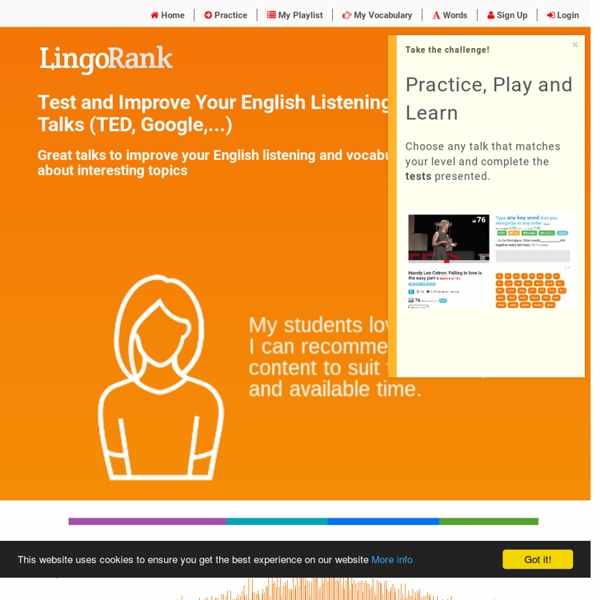TED talks for autonomous listening: ten activities
The first week of the Electronic Village Online is in full swing! I’m co-moderating the session on teaching listening, and this week, under the guidance of Lizzie Pinard, we’ve started out with the topic of encouraging learner autonomy. One great thing about online sessions like this one is that there are a lot of participants who share a wealth of tips about the activities and resources they use. From what I’ve read in our discussion threads, it seems that a lot of teachers encourage their learners to watch TED talks out of class, and the participants have suggested a variety of ideas for activities based on the talks. What also often happens, however, is that the teacher recommends this resource but the learners don’t start using it – and the teacher kind of knows that they don’t, but they don’t even ask because that would be admitting failure (oh haven’t I been there a lot of times?)
Fun stuff from all around the web
Fun stuff from all around the web: videos, adds, activities, games and just anything crazy or bizarre to put a smile on your face. All in English, of course! What would you do with an extra day?
Nik Peachey's Educational Technology & ELT Newsletter 14th Feb 2017
Hi and welcome to the first February edition of my Edtech and ELT Newsletter. In this issue I have a great collection of new articles most of which focus on three main themes - Digital literacies for teachers The role of artificial intelligence in homework marking and support The importance of encouraging students to think critically about news and information. In the tools section there’s a great collection of apps and resources and a link to one of the most useful search engines for digital research and study.
happy
English is a West Germanic language that was first spoken in early medieval England and is now a global lingua franca. Named after the Angles, one of the Germanic tribes that migrated to the area of Britain that would later take their name, England, both names ultimately deriving from the Anglia peninsula in the Baltic Sea. It is closely related to the Frisian languages, but its vocabulary has been significantly influenced by other Germanic languages, particularly Norse (a North Germanic language), as well as by Latin and French.[6] English has developed over the course of more than 1,400 years. The earliest forms of English, a set of Anglo-Frisian dialects brought to Great Britain by Anglo-Saxon settlers in the 5th century, are called Old English.
5 Benefits of Using Backchannels In Your Classroom
Over the last two weeks I've introduced a lot of teachers to using Padlet, TodaysMeet, and Socrative in their classrooms. All three of these tools can be used as backchannel and informal assessment tools. I've written about various ways to use each of these tools in the past. (Click here for TodaysMeet, here for Padlet, and here for Socrative). Here are some of the key benefits of using backchannels in your classroom.
English Listening Lesson Libary Online
ELLLO has SoMe Lessons! ELLLO is on social media. Follow us on the following social media platforms to get bonus content not found on elllo and updates to the lastest lessons. Facebook We have a facebook page! Follow us and get updates to lessons and the latest news from ELLLO!
Educational Technology and Mobile Learning: 15 Excellent YouTube Channels for Language Teachers and ESL Learners
January 13, 2017 YouTube hosts a treasure trove of excellent educational content that speaks to the learning needs of a wide variety of audiences. Some of this content is created by dedicated teachers and educators who took it upon themselves to promote learning beyond the traditional walls of their classrooms. For instance, in the area of English language learning, there are numerous language teachers (including EFL and ESL) who have set their own YouTube channels and provide video lessons covering almost everything related to language learning. Today's post highlights some of these channels. The purpose is to provide language teachers with relevant video resources that they can use in their instruction in class. Check out the list below and share with us your feedback in our Facebook page.
ESL Speaking Murder Mystery Game
Learn English with a Murder Mystery This is a 15 to 20 minute group work fluency exercise. Each person is one character.
Visual Dictionary, Visual Thesaurus
Visuwords™ online graphical dictionary — Look up words to find their meanings and associations with other words and concepts. Produce diagrams reminiscent of a neural net. Learn how words associate. Enter words into the search box to look them up or double-click a node to expand the tree. Click and drag the background to pan around and use the mouse wheel to zoom.
Pricing
Your first 14 days of elink.io are free, and you can make account changes at any time - no hassle and no questions asked. Free Forever: For Personal $0/month Curate & share personal content. Share information beautifully.
Third Conditional - A Fun Task - ELT Connect
The third conditional can be a pretty dry grammar point to teach! Here’s one way of making it a little more fun and engaging for your students. Enter the room upset and tell students that yesterday, you had the worst day imaginable – hold up your purse/wallet and ask students what they think happened. You might get something like this in response:‘Did you lose your purse/wallet?’ ‘You took someone else’s purse/wallet that had the same one as you’ ‘You bought a new purse/wallet and now you don’t like it.’



